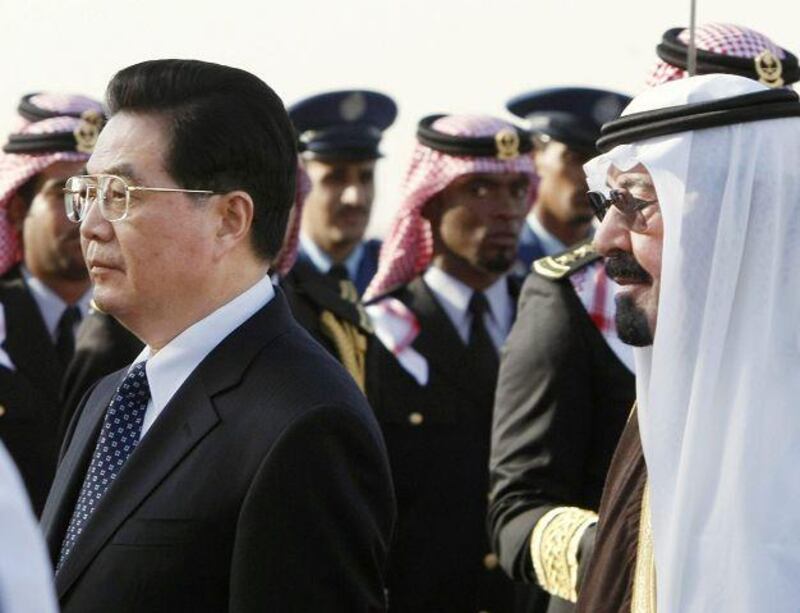RIYADH // China's president, Hu Jintao, arrived here yesterday for his second visit in three years as part of Beijing's continuing effort to deepen its trade and energy ties with the world's largest oil exporter. Mr Hu's visit draws into sharp relief yet again the growing commercial ties linking Saudi Arabia and its Gulf neighbours with China and other Asian countries.
It is a shift spurred by the Gulf countries' efforts to diversify their trade and political relationships that have traditionally been directed towards the United States and other western countries. "President Hu is leading a 100-member delegation that includes important ministers from the Chinese cabinet, which reflects the importance of Saudi Arabia to China," the Chinese ambassador to Riyadh, Yong Hong Lin, told local newspapers.
The Chinese officials will hold talks with their Saudi counterparts on a variety of projects that, apart from joint oil and gas ventures, involve bilateral programmes in agriculture, health and cultural affairs. Mr Hu will meet King Abdullah bin Abdul Aziz before departing tomorrow. He also plans to discuss trade liberalisation measures with Abdulrahman Hamad al Attiyah, the secretary general of the Gulf Cooperation Council, Agence France-Presse reported.
Western analysts say the expanding Saudi-Chinese relationship is not a threat to western interests for now, and should be viewed as a natural extension of China's burgeoning role in global trade, as well as a case of two countries filling mutual needs. "China is part and parcel of Saudi Arabia's effort to develop into a major industrial power," according to Jean-François Seznec, a visiting associate professor at Georgetown University's Center for Contemporary Arab Studies.
This "New Silk Route", as some call Saudi-Chinese trade ties, "brings machinery and equipment from Europe to the Gulf, the Gulf produces metals and chemicals [as well as oil], which is shipped to the East, in great part to China," Mr Seznec wrote in an e-mail. "In return, China sells consumer products to the Gulf." A better description of this commerce, Mr Seznec said, might be "the 'polyester route' since the exports from the Gulf are plastics".
John Sfakianakis, chief economist at the Riyadh-based Saudi British Bank, said in an interview: "Foremost, this is a trade relationship. China needs oil and Saudi Arabia needs tradable goods, labour and technical expertise." The Riyadh-Beijing relationship, he said, "is clearly one that signifies the strength of China's role in the global trade market and of Saudi Arabia's in the global oil market".
As of 2007, according to an article Mr Sfakianakis wrote in yesterday's Arab News, China was the second-largest supplier of imports to the kingdom, selling it garments, electrical products, air-conditioning units and textiles. Chinese sales to Riyadh in 2008 are estimated at $10.7 billion (Dh39bn), the economist wrote. More than 70 Chinese companies have business in the kingdom, of which 62 are construction firms. These firms employ almost 16,000 Chinese workers. Chinese companies have submitted bids for construction projects involving roads, railways, power generation and port development.





